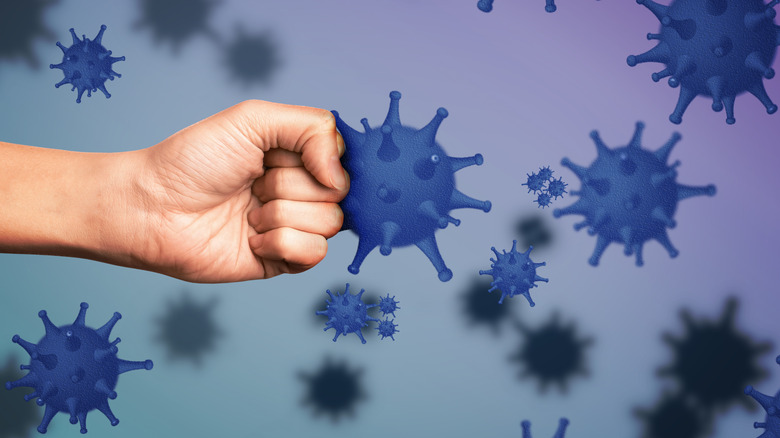Are Sinus Infections Contagious?
A sinus infection is unpleasant no matter who you are or how you got it. It is an inflammation of the sinuses located throughout the head. But where does it come from, and is a sinus infection something you can catch?
The sinuses are cavities with connecting passageways that are filled with air. Usually, mucus runs through the passages to help keep them moist, clean, and unobstructed. When the sinus lining becomes inflamed or a blockage occurs, it can cause the sinuses to fill with fluid. This fluid can then cause bacteria to grow, leading to infection. Symptoms of a blockage include runny or stuffy nose, facial pressure, cough, congestion, fever, fatigue, and even loss of smell (per Cleveland Clinic).
Colds are not sinus infections, yet a cold can become an infection. Colds come from viruses and usually develop over time (via Medical News Today). Cold symptoms, which are similar to those of sinus infections, build before eventually going away. These symptoms help spread a cold through coughing and sneezing out infected droplets (per John Hopkins Medicine). Allergies can also cause inflammation in the nose and sinuses due to a reaction to pollen, dust, or other irritants. The symptoms of allergies are a runny nose, congestion, sneezing, mucus in the throat, and itchy eyes. Unlike a cold though, allergies are not contagious. Other issues, such as a deviated septum or nasal polyps, can lead to sinus blockages and infections. So if you do develop a sinus infection, is it contagious?
Some sinus infections are contagious
Sinus infections can happen to anyone, since all they require is a blockage or inflammation to develop. Afterward, there are just the various symptoms that may or may not be spreading the infection. This uncertainty makes the answer to whether or not they are contagious a little complex, as the cause of the infection determines whether a sinus infection is spreadable.
If the infection develops from a virus, such as a cold, then your infection can be contagious. The virus's droplets can spread from your nose or mouth to others and infect them. The virus is specifically the contagious element. When spread, it will either cause a cold or sinus infection, or both. If you develop your infection from a blockage and buildup of bacteria, you will not be contagious. Likewise, it will not be contagious if your infection develops due to blockages from allergies or polyps. Unfortunately, it's not always easy to determine the cause of a sinus infection (per WebMD).
A virus can be contagious for over a week and usually takes about ten days to clear up. To prevent the spread of the virus, you should stay away from others when you have symptoms, wash your hands, and cover your nose and mouth when sneezing or coughing. To avoid catching a virus or sinus infection, try to avoid contact with the sick and wash your hands often. Try not to touch your mouth, nose, or eyes — especially in public.


